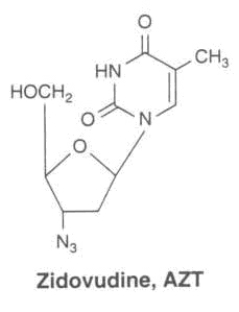Deck 10: Viruses
Question
Question
Question
Question

Unlock Deck
Sign up to unlock the cards in this deck!
Unlock Deck
Unlock Deck
1/4
Play
Full screen (f)
Deck 10: Viruses
1
The long terminal repeats of the acquired immunodeficiency syndrome (AIDS) virus are recognized by integrase and help direct the incorporation of viral complementary DNA (cDNA) into the genome.What else are they good for?
A)They encode the matrix and core proteins.
B)They form the primer for reverse transcriptase.
C)They encode reverse transcriptase.
D)They encode the proteins required to process gag-pol.
E)They contain the viral promoter region.
A)They encode the matrix and core proteins.
B)They form the primer for reverse transcriptase.
C)They encode reverse transcriptase.
D)They encode the proteins required to process gag-pol.
E)They contain the viral promoter region.
They contain the viral promoter region.
2
Azidothymidine (AZT; also called zidovudine) is a structural analog of thymidine.On the basis of its structure, what is its most likely mode of action against the human immunodeficiency virus (HIV)? 
A)It is a protease inhibitor (inhibits gag-pol processing).
B)It is an integrase inhibitor.
C)It causes early termination of HIV cDNA synthesis.
D)It causes early termination of HIV RNA synthesis.
E)It blocks the translation of viral proteins.

A)It is a protease inhibitor (inhibits gag-pol processing).
B)It is an integrase inhibitor.
C)It causes early termination of HIV cDNA synthesis.
D)It causes early termination of HIV RNA synthesis.
E)It blocks the translation of viral proteins.
It causes early termination of HIV cDNA synthesis.
3
Unlike bacteriophage T₄, l phage is capable of both lytic and lysogenic infection.The lysogenic state is maintained by:
A)Chemical modification of cytosine bases in the viral DNA, forming hydroxymethyl-cytosine.
B)Transcription of the cro gene.
C)Transcription of the gene for the l repressor.
D)Transcription of the xis and cro genes.
E)Exposure of the bacterium to ultraviolet radiation or other DNA-damaging agents.
A)Chemical modification of cytosine bases in the viral DNA, forming hydroxymethyl-cytosine.
B)Transcription of the cro gene.
C)Transcription of the gene for the l repressor.
D)Transcription of the xis and cro genes.
E)Exposure of the bacterium to ultraviolet radiation or other DNA-damaging agents.
Transcription of the gene for the l repressor.
4
Which of the following enzymes are never encoded by viral genes?
A)RNA replicase.
B)Reverse transcriptase.
C)RNA polymerase I.
D)Proteases.
E)Integrase.
A)RNA replicase.
B)Reverse transcriptase.
C)RNA polymerase I.
D)Proteases.
E)Integrase.

Unlock Deck
Unlock for access to all 4 flashcards in this deck.
Unlock Deck
k this deck


